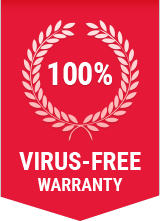What is ksecdd.sys?
Originally developed by Microsoft, ksecdd.sys is a legitimate file process and also called as Kernel Security Support Provider Interface that is associated with software Microsoft Windows Operating System. It is located in C:\Program Files by default.
ksecdd.sys virus is created when malware authors write virus files and name them after ksecdd.sys with an aim to spread virus on the internet.
Affected Platform: Windows OS
How to check if your computer is infected with ksecdd.sys malware?
If your system is affected by ksecdd.sys malware, you will notice one or the several below symptoms:
- ksecdd.sys occupies an unusually large CPU memory
- Erratic internet connection
- Your browser is bombarded with annoying popup ads
- Computer screen freezes
- PC's processing speed suffers
- You are redirected to unknown websites
To pinpoint the virus file location, take the following steps:
Step 1: Press CTRL+ALT+DEL keys at once to open Task Manager.
Step 2: If you notice the file located outside C:\Program Files you should run an antivirus scan to get rid of the malware.
How to remove ksecdd.sys malware from system using Comodo Cleaning Essentials?
You can either choose to remove ksecdd.sys and other malwares using Comodo Antivirus, or Comodo Cleaning Essentials (CCE) – both of which are absolutely free to download! CCE is a set of computer security tools designed to help you identify and remove malwares and unsafe processes from an infected computer.
To remove malwares using CCE, take the following steps:
1. Check the system requirements and download the feature-rich CCE suite for free.
2. After installation, choose the type of scan you want to perform. CCE offers 3 scan options to get rid of malwares from a PC:
- Smart Scan: Does a scan on critical areas of your system.
- Full Scan: Does a complete scan of your system.
- Custom Scan: Does a scan only on selected items.
The process to initiate the above mentioned scans are self-explanatory and thus, easy-to-use.
Additionally, it's recommended that you approve of any updates that the CCE will prompt you about to ensure it does a better job of identifying all the latest threats.
3. Click 'Next' to view the results.
Regardless of the type of scan you choose, the results will sometimes show false positive (flagging files that are actually safe), which has to be ignored. Only select the files you want to get rid of.
4. Click 'Apply' to apply the selected operations to the threats. The selected operations will be applied.
| No. | Company | File Type | SHA1 | MD5 | Malware Name |
Digitally Signed |
File Version |
Product Version |
Submitted From |
Malware Behavior |
|---|
- 4 items per page
- 8 items per page
- 16 items per page
- 32 items per page
| No. | Company | File Type | SHA1 | MD5 | Digitally Signed |
File Version |
Product Version |
Submitted From |
|---|---|---|---|---|---|---|---|---|
| 1 | Microsoft Corporation | Executable | fe0566b104ca7dae bf0fe910224e881a 0289bfa5 |
994ecc77a8cf366b 68d004fbcba4eb8e |
Yes | 10.0.19041 .1 (WinBuild. 160101.080 0) |
10.0.19041 .1 |
 104.238.128.144/32 104.238.128.144/32 |
| 2 | Microsoft Corporation | Executable | 1d913774b2bf2058 361b758dbd9a7413 f53e8cd2 |
c6ebf1d6ad71df30 db49b8d3287e1368 |
No | 5.1.2600.5 834 (xpsp_sp3_ qfe.090624 -1332) |
5.1.2600.5 834 |
 United States United States |
| 3 | Microsoft Corporation | Executable | 3ddf909b3dbea249 6087a0a40cc66d0d 3b68fcc3 |
1b92e46b5b32cd6d df86b13601660c84 |
No | 5.2.3790.4 935 (srv03_sp2 _qfe.11111 6-0305) |
5.2.3790.4 935 |
 United States United States |
| 4 | N/A | Non-executable | aad11c64d628bf98 be03b2a3b2773c18 f34ea534 |
2119cac24f88af85 d2ead3bd9e1a026d |
No | N/A | N/A |  United States United States |








